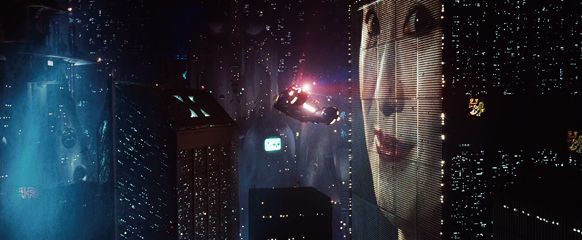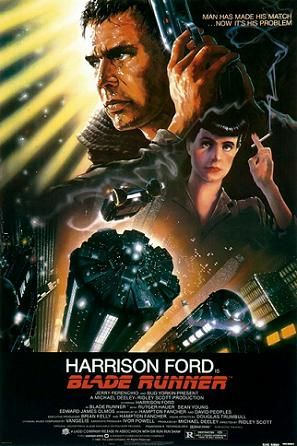Blade Runner Philosophy and Meaning
Blade Runner is one of the most deeply thematic and philosophic science fiction movie, using the philosophy of religion, literature (poetry of William Blake and the Bible-the replicants are analogous to fallen angels, they are "fall from the heavens" (off-world)), religious symbols, classical Greek drama and film noir. There is obvious tension between past, present and future in Blade Runner. The film foresees overpopulation, globalization, climate change and genetic engineering, all important issues of 20th century.
Among the themes explored in Blade Runner are the following: the dehumanization of people through technological and capitalistic society; the role of creation and creators; the nature and examining of humanity- the use of test with a number of questions in order to discover replicants. The replicants are compared to human characters, while the replicants show concern for one another, the humans are cold and impersonal, this is also another important theme, the question what is more valuable- human without emotions, or machines with; immortality and death (The replicants age rapidly and seek their creator to make it longer). Paranoia, manufactured by corporate power, omnipresent police and by genetic programming of the replicants, is present throughout the film. Paranoia is also presents through the limited life time of the replicants. Many themes reflects the idea of advanced and improved technological means, methods and devices that will solve all problems and satisfy all needs.
Blade Runner makes very effective and extensive use of eye symbolism, showing insight into themes and characters. The glow in the replicant's eyes represents a symbol for artificiality. The relationship between sight and memories is also referenced in Blade Runner, showing that we can not trust the eye see and the resulting memories. The climate in the future city of Los Angeles is different from today's. Industrial pollution has affected planet Earth and there is no real animals, and this is the reason why many people are going to the off-world colonies. One another important theme is the question what is more valuable- human without emotions, or machines with.
It captures elements of film noir- lighting, urban atmosphere of decadence, femme fatale-all females are the replicants i.e. artificial, they are manufactured to look like models, which gives a new meaning to the term "objectifying women"; questionable moral of the hero and it's ambiguity- Deckard shows human attributes when he falls in love with Rachael and also some characteristic of the replicants when he struggles to find his own identity. The story makes audience to ask questions: What is the difference between being human and being non-human?
We can find his influence everywhere, its themes has been borrowed by sci-fi movies, music, video games. Adventure games inspired by Blade Runner are: Snatcher, Rise of the Dragon, Beneath a Steel Sky, Flashback, Manhunter, Final Fantasy VII, Neuromancer, among others. Westwood released the game adaptation of Blade Runner, that evokes memorable aesthetic of the film, and has original narrative.
There are documentaries on Blade Runner: On the Edge of Blade Runner was produced by Nobles Gate Ltd in 2000; Future shock from 2003 by TV Ontario; Dangerous Days: Making Blade Runner in 2007, produced and directed by Charles de Lauziriks, All our Variant Futures: From Workprint to Final Cut by Paul Prischman

